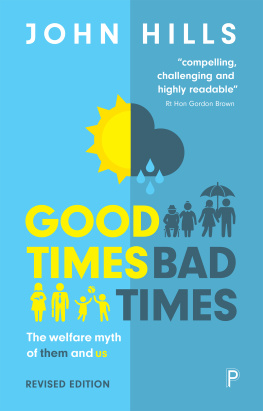First published by Unwin Paperbacks 1983
This edition published in the Taylor & Francis e-Library, 2010.
To purchase your own copy of this or any of Taylor & Francis or Routledges collection of thousands of eBooks please go to www.eBookstore.tandf.co.uk.
This book is copyright under the Berne Convention. No reproduction
without permission. All rights reserved.
UNWIN PAPERBACKS
40 Museum Street, London, WC1A 1LU, UK
Unwin Paperbacks,
Park Lane, Hemel Hempstead, Herts HP2 4TE, UK
Allen & Unwin Inc.,
9 Winchester Terrace, Winchester, Mass 01890, USA
George Allen & Unwin Australia Pty Ltd.,
8 Napier Street, North Sydney, NSW 2060, Australia
Editorial selection John Griffith, 1983
Individual chapters John Griffith, Tony Atkinson, Colin Crouch,
Meghnad Desai, Howard Glennerster, Christopher Husbands,
Julian Le Grand, Jane Lewis, Michael Mann, Doreen Massey,
Robert Power, Mike Reddin, 1983
British Library Cataloguing in Publication Data
Socialism in a cold climate.
1. Socialism in Great Britain
I. Griffith, J.A.G.
335.00941 HX246
ISBN 0-04-335050-X
Library of Congress Cataloging in Publication Data
Main entry under title:
Socialism in a cold climate.
Includes index.
1. SocialismGreat Britain. 2. Great Britain
Economic policy1945 . 3. Great Britain
Social policy. 4. Great BritainPolitics and government1964 . 5. Labour Party (Great Britain)
I. Griffith, J.A.G. (John Aneurin Grey)
HX249.S63 1983 335.00941 8222731
ISBN 0-04-335050-X (pbk.)
ISBN 0-203-83976-5 Master e-book ISBN
Introduction
John Griffith
Thatcherism in 1979 seemed very like the standard Conservative product: tax cuts, promises of a review of the social services to eliminate extravagance and wastage, law and order, curbs on trade unions, reduction in Government intervention and in subsidiesdown with nationalisation, up with free enterprise. These were the slogans believed to be election winners in those constituencies where winning and losing mattered. Then, after victory, very large hand-outs followed to those with the highest incomes, while VAT increases cancelled out the tax reliefs at the lower levels.
It was to be expected that standard Conservatism, like too much standard Labourism, would then sit back, contemplate the real world and see, from day to day, what might be done to move some way towards the fulfilment of some election pledges. No need to be over-literal; a weeks a long time; circumstances alter cases; the business of government is a private affair; the Civil Service pulling back Ministers to that central consensus; no cause for drastic action; hope for the best and accommodate to the worst.
But Thatcherism departed from the standard and, to a very considerable extent, despite the protests from right, left and centre, persisted in its aim of seeking to improve the competitiveness of British industry by deflating the economy, creating huge unemployment, weakening the trade unions and forcing small firms into bankruptcy.
Today we are witness to an unusual phenomenon in British politics: a Government which not only has no positive social policies but takes pride in having none. We have no idea how it is planned that major state responsibilities in housing, roads, land use, education, health and welfare services will develop over the next few years because the Government has no plans, except in a few instances to transfer some of those responsibilities to private ownership. Ministers for the social services stand like figureheads at the prows of the becalmed ships of their Departments, saying and doing very little except considering how further financial cuts may be imposed. No attempt is being made to consider how the social well-being of the nation may be improved.
All this was not achieved without help from elsewhere. But Thatcherism has no wish to excuse the consequences of its own policies by blaming the world recession. On the contrary, it wishes to claim the credit for everything except unemployment. So there is much wringing of hands in public about the jobless, while in private the policies which deprive people of work, over and above those attributable to external causes, continue to be directly and deliberately pursued.
Governments like to publicise some economic aim which is both easy to understand and almost certainly attainable. Wilson used the balance of payments and then the voluntary control of wages. For Thatcher the trick was initially to pursue policies that boosted the rate of inflation and then to justify public-expenditure cuts over the years by the need to reduce that rate, all of this, and more, being subsumed under monetarism.
But these are means not ends. And the end is to collapse the economy.
In this sense, Thatcherism has been a highly interventionist type of Conservatism. In addition, partly by legislation but much more by changing the political, ideological and economic climate, it has contained trade unionism and greatly reduced the standard of living of the poor by keeping percentage wage increases far below the level of inflation, holding down supplementary benefit payments and weakening the social services.
One of the five tasks which the Conservative party set itself in its 1979 Election Manifesto was to support family life, by helping people to become home-owners, raising the standard of their childrens education and concentrating welfare services on the effective support of the old, the sick, the disabled and those who are in real need. The transparent ambiguities of that last phrase are not a sufficient defence to the charge that this statement was dishonest. Reducing the level of the social services was an inevitable, intended and central part of the economic and financial strategy.
For these reasons, appeals to Thatcherism to indulge in modifications of its policy, to effect even a modest U-turn, mistake the nature of that policy. Governments have hitherto sought to manage the economy. Thatcherism seeks to change it. Thatcherism seeks not to help industry but to create the harsh economic conditions in which industry will be forced to make the changes necessary to keep itself alive.
This is most obvious when we consider what will happen if the Conservative Party is returned to power at the next general election. Mrs Thatcher has said many times that she needs a second term. But there is no suggestion that in that second term, continuing until nearly the end of the 1980s, there will be any change in policy. Indeed, the promise is for more of the same. There is no suggestion that, having put the country on a sounder footing (as the Conservatives would claim), Government will seek through positive action to reduce unemployment, to restore the social services, to improve the conditions of the poor. Thatcherism is unable to offer any alleviation. All those policies which socialists must insist onan increase in industrial activity, the reduction of unemployment, the improvement of social servicesare bound to militate against the strategy of Thatcherism.










